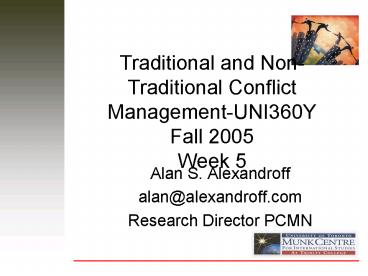Traditional and NonTraditional Conflict ManagementUNI360Y Fall 2005 Week 5 - PowerPoint PPT Presentation
1 / 16
Title:
Traditional and NonTraditional Conflict ManagementUNI360Y Fall 2005 Week 5
Description:
European politics of weakness (appeasement) or of sophistication ... EU as an international system - preserving peace-a post modern structure and ideology ... – PowerPoint PPT presentation
Number of Views:29
Avg rating:3.0/5.0
Title: Traditional and NonTraditional Conflict ManagementUNI360Y Fall 2005 Week 5
1
Traditional and Non-Traditional Conflict
Management-UNI360YFall 2005Week 5
- Alan S. Alexandroff
- alan_at_alexandroff.com
- Research Director PCMN
2
Summary
- Traditional Diplomatic Strategy
- Two conceptions of international conflict
management - Liberal Institutions and Grand Coalitions
3
Strategic Elements War on Terror Bush
- War on Terror at National Endowment for Democracy
October 6, 2005 - Break the organized terror networks
- Deny WMD to outlaw regimes and to terrorist
allies - Deny radical groups the support and sanctuary of
outlaw regimes (Syria and Iran) - Deny terrorists control of any nation (Iraq)
- Deny terrorists the future recruits replace
hatred and resentment with democracy and hope in
the Middle East
4
War on Terror Al Quida
- The centrality of the war in Iraq for the global
jihad - The ultimate goal is a caliphate
- Political action must equal military action
- The need to maintain popular support among the
street
5
OffensiveRealism I
- Structure drives state behavior
- Absence of a central authority
- The capability to act
- Uncertain over others intentions (security
dilemma)
6
Offensive Realism II
- IR is a ruthless dangerous business
- States seek to maximize share of world
power-gaining power at the expense of others - The coming challenge
- Ultimate aim to be a hegemon
- States have revisionist intentions
- A desire to alter the balance of power
- Defend BoP when others seek hegemony
7
Motivation of Statesmen
- Offensive Realism-Aggressive Hegemon
- A struggle for survival-in a world of anarchy
- Status quo powers rarely found
- Look for opportunities to gain power
- Ultimate goal to become the hegemon
- All effort to maximize power create
security-increase odds of survival and leaves
open the possibility of achieving hegemony
8
Kaplan, KissingerMetternich Hitler
- Prince Clemens von Metternich- A World Restored
- Alliances on philosophical values
- Not a focus on ethnic identification
- Napoleon-The Revolutionary Chieftain
- Kissingers realism
- Struggling against appeasement
- Kissingers shortcomings
9
Architecture ofIR
- Objective of all statesmen
- Create a balance of fear, cooperation, and
defensive mechanisms - Not a just or fair system but accepted by all-and
as long as maintained dealt with all
revolutionary changes - Cannot settle international disputes on good
faith and a willingness to agree - The great threat to IR
10
Americans from MarsEuropeans from Venus
- Recourse to force (results) or recourse to
negotiation, diplomacy and persuasion as opposed
to coercion (process over result) - Strategy and capability gaps
- Material and ideological differences reinforce
one another - US strategy of indirection in the 18 19th
Century - Europe Machtpolitik and the emergence of the
new Europe - Consequences of the end of the Cold War a
growing gap - European politics of weakness (appeasement) or of
sophistication - The indispensable nation or the
Europeanhyperpuissance
11
A European ViewMultilateralizing the Goal
- Tactics of the weak and multilateralism
- Constrain the US-without acting themselves
- Europe rejects its past
- Rejects Machtpolitik BoP
- Security from the outside
- A higher tolerance for threats or fear of
conflict?
12
The Role of A Power Gap
- EU as an international system - preserving
peace-a post modern structure and ideology - The indirect approach from rapprochement to a
strategy of economic cooperation leading to
peaceful integration (a method of peace) - Moral consciousness and the European
transcendence of power - Inter-state relations subject to the rule of law
- Europes new way threatens Europes new mission
- Failure of the European approach could be a
failure of the objective in Europe
13
A Settlement with Constitutional
Characteristics
- Basic institutions and operating principles
provide expectations limit on what the leading
state can do reduce the returns to power - Success a result of
- Reluctance towards hegemonic domination
- Open and penetrated character of American system
- Constraining effects of postwar economic and
security institutions (highly institutionalized) - In conclusion a Liberal order
14
Concerts
- Defn
- Jointly manage their shared interest
- Prerequisites
- BoP, non-isolationism, ideological agreement
15
Factors InfluencingSuccess
- Satisfaction with the existing order
- Recognition of the costliness of war
- Institutionalization of norms
- Voice-based organizational mechanisms
- 21st century of Great Powers
16
EncompassingCoalitions
- A system of overlapping clubs institutions of
varying size and membership dealing with
different issues - Clubs are heterogeneous differing in form as
well as function - Histories-clubs grow and evolve both in function
and size - Founders a small club between universalism and
regionalism avoid these and nationalism - A world of clubs dealing with functional and
geographic areas































